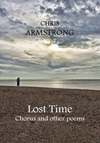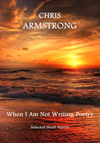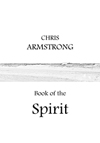Chris Armstrong has had three careers, working as a merchant seaman and navigator, a farmhand on the farm where he still lives in the mountains of mid-Wales, and as an information scientist before retiring to become a poet and writer. He has one longer collection of poems in print, Mostly Welsh (Y Lolfa, 2019) and a recent chapbook, Book of the Spirit (Curated Lines, 2022). Although initially entirely focussed on poetry, he moved on to short stories—When I Am Not Writing Poetry (Curated Lines, 2023)—while his first full length work of fiction, The Dark Trilogy (Austin Macauley, 2022) was being published. He is now working on a further novel. He has been published, for example in Storgy, Agenda and London Grip New Poetry. He writes about his writing and publishes the occasional poem on the Curated Lines blog at https://curatedlines.online/.
 Lost Time brings together a collection of poems written during the last two to three years.
Lost Time brings together a collection of poems written during the last two to three years.
There are poems that relate to Place (mostly Wales), the Sea (if not the sea, then the horizon! The sea is always there), Writing, Memories and Time… and a few poems brought about by Covid and lockdown found their way in at the beginning.
![]() There are no breaks between the themes and they do not have section headings as it would be fair to say that their edges are blurred, each one blending softly into the next.
There are no breaks between the themes and they do not have section headings as it would be fair to say that their edges are blurred, each one blending softly into the next.
This collection of short stories by Chris Armstrong – some very short and one almost the length of a novella – was written during the latter half of 2020 while he was locked down in front of his computer during Covid! And there are only so many poems a man can write! Several of the stories make oblique reference to the Covid ‘plague’ but other tales are a reflection of the author’s earlier life, a half-dozen of them going all the way back to his time at sea!
![]() Regular readers – of both his poems and his fiction – may notice a tendency to link themes to the sea! And if not the sea, then the horizon! The sea is always there!
Regular readers – of both his poems and his fiction – may notice a tendency to link themes to the sea! And if not the sea, then the horizon! The sea is always there!
Many of my traditional images, found in many of my poems and writings – time, the horizon, the sea – as well of course as love, find a place again in these lines – in my prayers.
‘Rooted in the mythologies of religion, of church, synagogue and the Zen Buddhist temple or monastery, and calling, too, on the Graeco-Roman gods and muses, this collection borrows words, terminologies and phrases as well as their characteristic styles to resonate with the Christian and Jewish language and liturgies, with just a whisper of Far Eastern religions. Blending near identical theologies around a single belief system, a religion centred on love, there are echoes of the Old Testament of the Bible, and of the Torah, the Talmud, and Midrash and Kabbalistic teachings. For example, Kabbalistic teaching suggests that the manifestation of God that we perceive is his unity, when he transitions from nothing to one, just as Zen masters understand the nothingness of the godhead: a God present in nothingness.
![]() Despite this heritage, the collection speaks from – and for – the spirit of the modern world. It is the voice of our deepest, most primal faith.’ – Chris Armstrong
Despite this heritage, the collection speaks from – and for – the spirit of the modern world. It is the voice of our deepest, most primal faith.’ – Chris Armstrong

